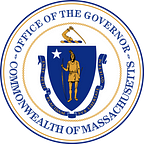From the Desk of Governor Charlie Baker: Stopping the Spread
Dear Fellow State Employees –
I got my head shaved with a lobby full of pro athletes, media personalities and hundreds of Granite Telecommunications employees to raise money for cancer research less than two weeks ago.
Seems much longer than that.
But we are now where we are, and I believe we are doing the right things to deal with this public health crisis. I also recognize and appreciate that many of these decisions come with disruptions, dismay and disagreement. Change of this magnitude in such a short period of time is jarring under any scenario, and these changes come with financial and health risks on top of them.
When people ask me why I’ve spent almost 20 years of my professional career either working or serving in a volunteer capacity in government, I always say the same thing: Where else can you make something good happen for people, or stop something bad from happening to people?
That maxim has never been truer — or more complicated to explain or understand.
For the short term, our goal is to keep COVID-19 from spreading. That message gets interpreted in a variety of ways. Let’s try this. 80% of the people who catch COVID-19 are going to feel like they have the flu. That’s it. Many people may walk around with it for a few days before they even know they have it. But it is very contagious. It is spread through droplets — it is not airborne. That’s why we tell people to wash their hands regularly, use hand sanitizer, cough into their elbow and maintain some distance.
A friend of mine was at a birthday party the other day, watched the birthday boy blow a mouthful of breath and saliva all over the cake as he blew out the candles, and then watched his family cut up the cake and serve it to everyone in the room. Not good!
No handshakes, close talking, high fives or hugs.
Now for the other 20% of the people who catch COVID-19, it will be serious — probable hospitalization and for some, it will be deadly. It is particularly dangerous for people over the age of 70, or those who have pre-existing medical conditions.
So the goal here is to limit the speed and the size of the spread — so the disease itself doesn’t overwhelm our health care system — and hopefully reduce the number of people who are particularly at risk from getting it in the first place.
I am going to do all I can to maintain social distance, wash my hands, do phone calls instead of meetings, and try to stay healthy. Because I do not want to give it to my family and friends — and I need to do my job. I have also stopped visiting my 91 year old dad — which I usually do every week.
Stopping the spread — really separating the healthy among us from those among us who have caught COVID-19 — is the single most important thing we can do to slow it down and limit its impact on our health care system and one another. This is why we have implemented a series of very aggressive steps to limit person to person contact.
It is also why we have worked with state managers and labor leaders to develop a plan that makes it possible for many, many state employees to work either partially or totally remotely, and why we have created the technology infrastructure to pull this off. More details are available here.
I want to thank the people who spent many hours over the past five days figuring this out, because this is the time when people expect their government to lead and to serve. Most people understand that many of our decisions come with positive benefits and negative consequences — they understand trade-offs in times of crisis. But as long as people believe we are pulling the oars together and doing the best we can to keep them safe, work on their issues, and staying on top of our ongoing responsibilities, they get it and they appreciate it.
And I have no doubt that we will.
Unemployment claims are being processed. Trains, buses and the commuter rail are running. Utilities are operating, and rules that protect individuals and families from dislocation have been issued. Small business assistance is being put into place. Our emergency operations centers are up and running. Phones are being answered. Driver’s licenses are being issued and renewed. Public safety officials are on the job — on our streets, in our neighborhoods, and managing our correctional operations. Service providers are being paid to care for those who need it most, and programs that feed and house the less fortunate among us are up and operating.
Thousands of public servants are stepping up, and I know I speak for many when I say thank you for all that you do — in good times and in bad times.
And to fight back against the coronavirus and COVID-19, we stood up a Command Center, led by Marylou Sudders, who has proven her mettle time and time again as Secretary of HHS. The Center will serve as the focal point of our response to this public health crisis — working with our world class provider community and many others. Its agenda will be broad and subject to change, but fundamentally, the Center will use every resource available to coordinate its work with our health care community, leverage the experts we know live and work here in Massachusetts, and build and execute a game plan to ensure that we succeed in pushing back against this disease.
There is much to do. We are grateful for your commitment to your fellow residents. And we give you our word that we will devote everything we have to defeating this.
All the best,
Charlie Baker
